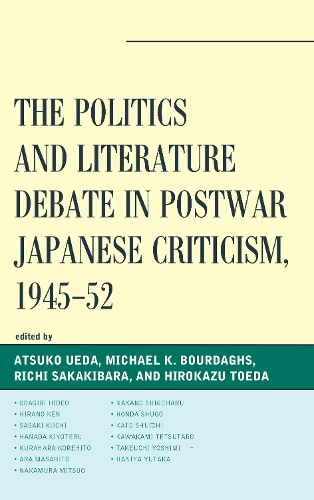
The Politics and Literature Debate in Postwar Japanese Criticism, 194552
(Paperback)
Available Formats
Publishing Details
The Politics and Literature Debate in Postwar Japanese Criticism, 194552
By (Author) Atsuko Ueda
Edited by Michael K. Bourdaghs
Edited by Richi Sakakibara
Edited by Hirokazu Toeda
Contributions by Odagiri Hideo
Contributions by Hirano Ken
Contributions by Sasaki Kiichi
Contributions by Hanada Kiyoteru
Contributions by Kurahara Korehito
Contributions by Ara Masahito
Bloomsbury Publishing PLC
Lexington Books
23rd March 2018
United States
Classifications
Professional and Scholarly
Non Fiction
Asian history
895.609005
Physical Properties
Paperback
358
Width 150mm, Height 228mm, Spine 27mm
531g
Description
In the wake of its defeat in World War II, as Japan was forced to remake itself from empire to nation in the face of an uncertain global situation, literature and literary criticism emerged as highly contested sites. Today, this remarkable period holds rich potential for opening new dialogue between scholars in Japan and North America as we rethink the historical and contemporary significance of a number of important issues, including the meaning of the American occupation both inside and outside of Japan, the shifting semiotics of literature and politics, and the origins of crucial ideological weapons of the cultural Cold War. This collection features works by Japanese intellectuals written in the immediate postwar period. These writingsmany appearing in English for the first timeoffer explorations into the social, political, and philosophical debates among Japanese literary elites that shaped the countrys literary culture in the aftermath of defeat.
Reviews
This ambitious volume provides a long-missing perspective on Japanese literary production in the vortex of the immediate postwar. Indeed, one could argue we have been hard-pressed to understand the full import of postwar Japanese literature without it. Brought to life in translations by distinguished scholars, these essays allow us at last to situate fiction and poetry of the time in the context of the fraught intellectual debates of a society emerging from fascism. Moreover, in their passion and their sheer detail and nuance, these essays dissolve facile oppositions between communism and individualism, the aesthetic and the political, that have shaped Cold War frameworks for the study of Japan. Rather, they illuminate the commingling of modernism, Marxism, and existentialism in a vein of humanist discourse that could be said to constitute the specificity of Japan in the global postwar. -- Brett de Bary, Cornell University
This collection captures the energy and intensity of the exchange among Japanese writers and literary critics, known as the Literature and Politics Debate (194647), in which the autonomous status of literature was defended against the primacy of politics that the resurgent Marxist discourse powerfully promoted. The concise introduction and extensive annotations situate this intellectual debate within a larger historical context and offer a nuanced understanding of the controversy. Masterfully translated, the essays in this volume serve as essential sources for understanding the Japanese intellectual climate in the early postwar years. -- Yoshikuni Igarashi, Vanderbilt University
Author Bio
Atsuko Ueda is associate professor of modern Japanese literature in the Department of East Asian Studies at Princeton University. Michael K. Bourdaghs is professor of modern Japanese literature in the Department of East Asian Languages and Civilizations at the University of Chicago. Richi Sakakibara is professor of modern Japanese literature at Waseda University. Hirokazu Toeda is professor of modern Japanese literature at Waseda University.
